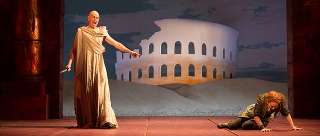|
Back
An intriguing Vivaldi venture Albany
Alice Busch Theater
07/18/2015 - & July 24, 27*, August 1, 4, 9, 16, 20, 22, 2015
Antonio Vivaldi: Catone in Utica, RV 705
Thomas Michael Allen (Cato), John Holiday (Caesar), Megan Samarin (Marzia), Allega Da Vita (Fulvio), Eric Jurenas (Arbace), Sarah Mesko (Emilia)
The Glimmerglass Festival Orchestra, Ryan Brown (conductor)
Tazewell Thompson (director), John Conklin (set designer), Sara Jean Tosetti (costume designer), Anthony Salatino (choreographer), Robert Wierzel (lighting designer)

(© Karli Cadel)
The Glimmerglass Festival has been performing works from the pre-Classical period for the past twenty years. This is their first Vivaldi work and the first time the work has been staged in North America.
Catone in Utica (billed here as Cato in Utica) is one of the last of Vivaldi’s 90 or so operas, composed in 1737, just four years before his death. The music, as one would expect, is animated and varied, with each aria or vocal exchange imbued with the appropriate sentiment.
The libretto is by the ubiquitous Metastasio and was set by many other composers. As with most Vivaldi opera, some of the music is lost, notably that for Act I. Some productions and recordings have used other music composed for the libretto, but this production gives us Acts II and III only, with a few brief titles to explain the dramatic situation.
The plot focuses on an historical figure, the Younger, who, in what turned out to be the waning days of the Roman republic, is in violent opposition to the ambitious Julius Caesar, who has pursued Cato to the North African city of Utica. Meanwhile his daughter, Marzia, in the contrary manner of so many opera seria maidens, declares her love for her father’s enemy, while Cato wants her to marry a neighbouring prince, Arbace. Then there is Emilia, widow of Cato’s ally Pompey, who is bent of killing Caesar, whose lieutenant, Fulvio, his love for her. Thus the basic operatic conflict of love versus duty is front and centre.
Initially the conducting of Ryan Brown, director of Washington’s Opera Lafayette, struck me as lacking the essential Vivaldian bite, although perhaps I’ve been listening to too much Jean-Christophe Spinosi, because the accompaniment turned out to have all the attaca necessary during Caesar’s second aria with its vengeful message. The character’s first aria shows him in wooing mode as he attempts to sway Cato to his political aims (and, after all, he is in love with the daughter). In this role counter tenor John Holiday is one of the happy discoveries of this year’s festival (other being Jacqueline Echols and Soloman Howard). He makes a vivid impression in everything he sings – here is yet another performer to join today’s rich roster of counter tenors.
Thomas Michael Allen gives a thoroughly believable performance as Cato, the stubborn, battle-scarred political warrior. This tenor role stands out among a cast that otherwise consists of three mezzo-sopranos and two counter tenors. The second counter tenor role, that of Arbace, Prince of Numidia, is taken by one of the festival’s Young Artists, Eric Jurenas, whose lighter, airier voice contrasts well with Mr. Holiday’s. His jaunty introductory aria is a delight.
Sarah Mesko is aptly vehement as the vengeful Emilia. Young Artist Megan Samarin, as Marzia, makes a fine impression in the closest thing to an ingénue role in the work. Yet another Young Artist, Allegra Da Vita, makes a handsome contribution as Fulvio, the opera’s travesti role.
John Conklin’s design gives us an iridescent ruin which provides a number of convenient objects for singers to climb or sit upon; moments of real action are few a far between in such a “stand and deliver” work.
Vivaldi originally created an ahistorical but audience-pleasing happy ending. Here a choice was made to reveal the fact of of Cato’s noble suicide, using music by Ciccolini. This resolution comes as an abrupt anti-climax but it is eloquently staged.
Opera Lafayette will be performing a version of this production later this year in Washington and New York.
Michael Johnson
|